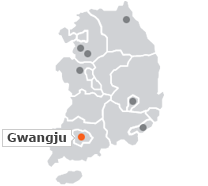Seonam Technology Application Division
Research Institute of Intelligent Manufacturing & Materials Technology
Research Institute of Human-Centric Manufacturing Technology
Research Institute of Sustainable Development Technology
Seonam Technology Application Division
Dongnam Technology Application Division
Daegyeong Technology Application Division
Gangwon Technology Application Division
Ulsan Technology
Application Division Jeonbuk Technology Application Division Jeju Technology
Application Division
Application Division Jeonbuk Technology Application Division Jeju Technology
Application Division
KITECH operates a research institute for each of its three key research areas in the South Korean cities Incheon, Ansan and Cheonan. In order to provide close-range support to SMEs located near their production sites, KITECH also operates regional divisions in Gwangju, Daegu, Busan, Gangneung, Ulsan, Jeonju and Jeju.
Seonam Technology Application Division (Purpose Built Mobility)
Seonam Technology Application Division (Purpose Built Mobility) was established to transform the industrial structure of the Jeonnam regions. To promote the growth of region-specific industries, the division develops and implements automotive components and materials technology, optical energy convergence technology, and nano convergence display lighting technology.
- Seonam Technology Application Division
- Automotive parts, optical LED and semiconductor convergence

Function and Role
Secure key technologies for implementing future mobility
Lead regional specialized industries through the development and commercialization of autonomous driving, parts materials, eco-friendly energy, and nano-technology based on sensors
Organization
Purpose Built Mobility Group
- Commercialization of Purpose Built Mobility production technology
- Develop vehicle control and autonomous driving platform technology for Purpose Built Mobility
- Develop highly efficient power parts design and application technology
- Develop multi-functional lightweight materials and parts technology for weight reduction of the body
- Develop high-strength lightweight material mold/processing and welding/bonding technology
Energy & Nano Technology Group
- Develop next-generation energy storage materials, parts and systems manufacturing technology (solid secondary battery, P2G (hydrogen production) element technology)
- Develop technology for manufacturing optical semiconductor devices, modules, and parts (optical communication, automotive semiconductor, fusion sensor unit/integration process technology)
- Develop material parts technology for energy production systems (solar, fuel cells, water electrolysis, waste heat core materials and production-based technologies)